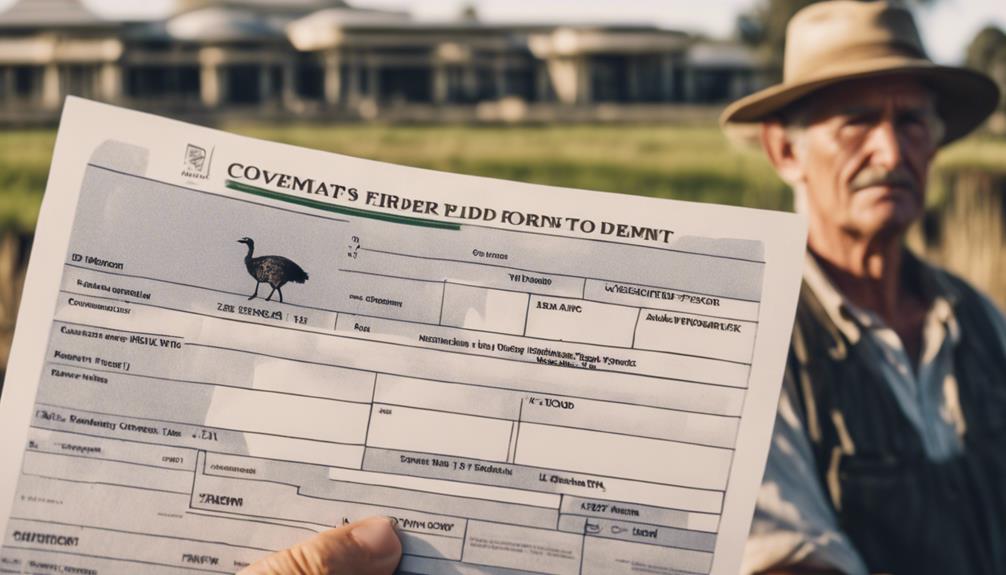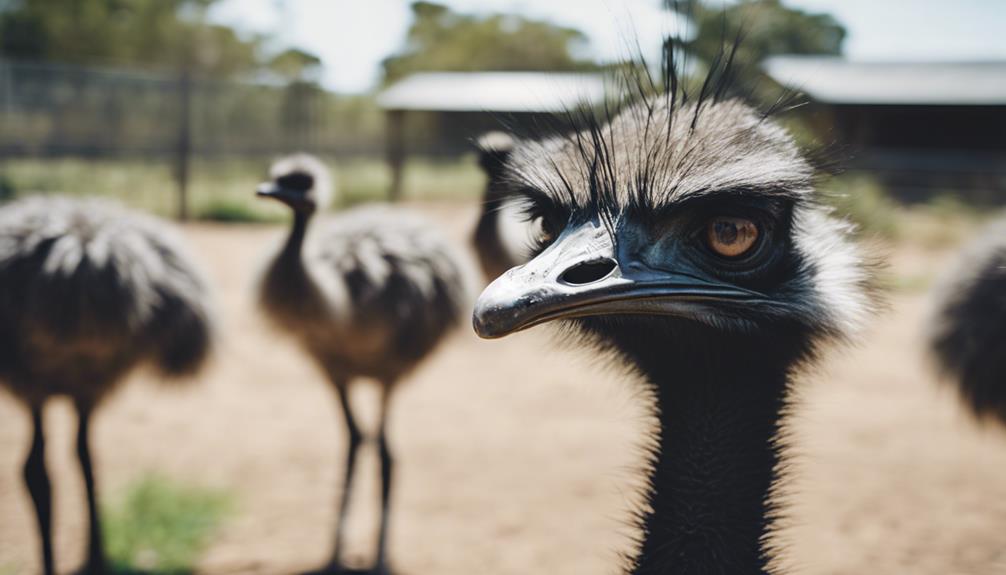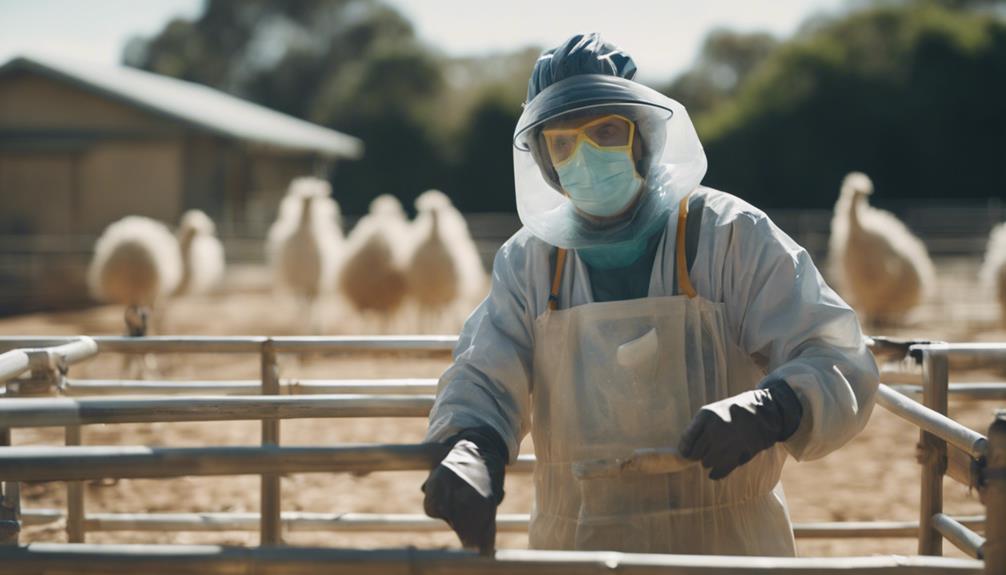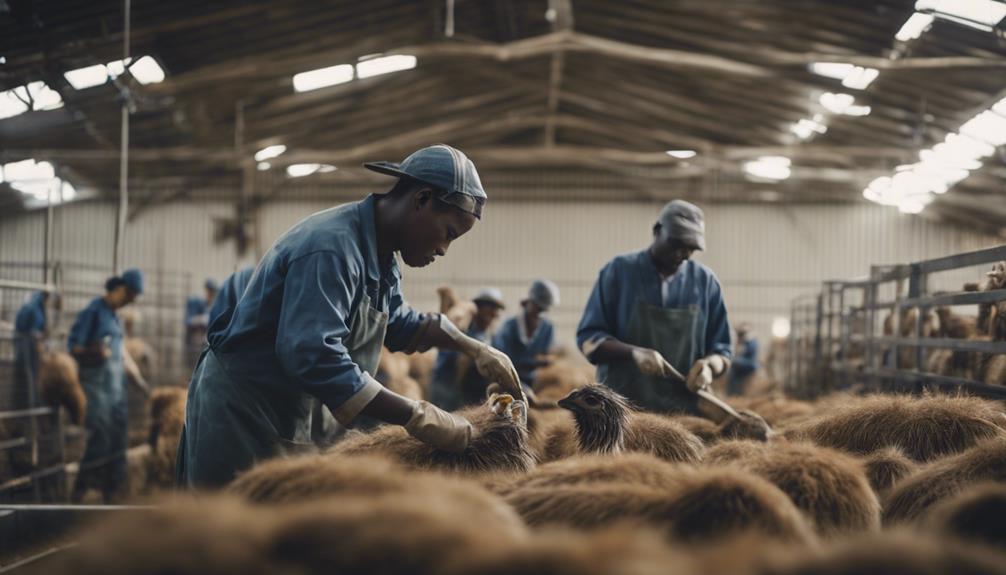
When it comes to emu farming, navigating the legal landscape is paramount for your operation's success. From permits and zoning to animal welfare and biosecurity, each aspect requires careful attention. But have you considered the implications of liability insurance and the complexities of import and export restrictions? Understanding these legal considerations can shape the future of your emu farming venture in more ways than you might anticipate.
Key Takeaways
- Obtain permits for animal welfare and biosecurity.
- Adhere to zoning regulations to avoid fines.
- Comply with Animal Welfare Laws for proper care.
- Consider liability insurance for financial protection.
- Implement biosecurity measures to prevent disease outbreaks.
Permits and Licenses

Before embarking on your emu farming venture, ensure you have obtained all the necessary permits and licenses required by local authorities. To legally operate an emu farm, you must adhere to specific regulations set forth by governmental bodies. These permits typically cover areas such as animal welfare, biosecurity measures, and land use. Failure to secure the proper documentation can result in fines, closure of your operation, or even legal action.
The first step is to contact your local agricultural department to inquire about the specific permits needed in your area. You'll likely need a permit for owning exotic animals, a farm operation permit, and potentially zoning permits depending on your location. Each permit will have its own set of requirements that must be met to ensure compliance with the law.
Furthermore, obtaining the necessary licenses demonstrates your commitment to operating a legitimate and responsible emu farm. It showcases your dedication to upholding industry standards and protecting the well-being of your emus. By obtaining the required permits and licenses, you establish yourself as a reputable and authoritative figure in the field of emu farming.
Zoning Regulations
Ensure compliance with local zoning regulations to establish the permissible land use for your emu farming operation. Zoning regulations dictate where and how you can operate your farm. Zoning laws classify different areas for specific uses, such as agricultural, residential, or commercial.
Before starting your emu farm, consult with local authorities to determine the zoning designation of your chosen land. Verify that emu farming is allowed in that particular zone and ensure that you meet any specific requirements, such as minimum acreage or setbacks from property lines.
Failure to adhere to zoning regulations can result in fines, forced closure, or legal action. Additionally, consider the impact of your farming activities on neighboring properties when choosing a location. By understanding and following zoning regulations, you can establish a solid foundation for your emu farming business and avoid potential legal issues that may arise from non-compliance.
Animal Welfare Laws

To maintain legal compliance and ethical standards in your emu farming operation, familiarize yourself with the Animal Welfare Laws that govern the treatment and care of emus. These laws set forth specific requirements regarding the housing, feeding, and overall wellbeing of emus on your farm. It's imperative to ensure that your emus have access to clean water, appropriate shelter, and a suitable diet to meet their nutritional needs. Regular veterinary care and monitoring are also essential to uphold the welfare of your emus.
Under these laws, it's crucial to prevent cruelty, neglect, or mistreatment of emus. Failure to adhere to the Animal Welfare Laws may result in severe penalties, including fines and potential legal action. By strictly complying with these regulations, you not only demonstrate your commitment to ethical farming practices but also safeguard the reputation and sustainability of your emu farming business. Stay informed about any updates or changes to the Animal Welfare Laws to ensure ongoing compliance and the welfare of your emus.
Liability Insurance
Consider obtaining liability insurance to protect your emu farming operation from potential financial risks and legal liabilities. In the realm of emu farming, where unforeseen circumstances can arise, having liability insurance can provide a safety net against unexpected events that may lead to legal disputes or financial losses.
Here are three key reasons why liability insurance is crucial for your emu farming business:
- Protection from Lawsuits: Liability insurance can shield you from the financial burden of legal claims or lawsuits filed against your emu farm. In the event of an incident involving a third party, such as a customer or visitor getting injured on your property, liability insurance can cover legal expenses and potential settlements.
- Coverage for Property Damage: Accidents happen, and property damage can occur on an emu farm. Liability insurance can help cover the costs associated with damages caused by your farming operations, such as structures, equipment, or crops.
- Peace of Mind: By having liability insurance in place, you can operate your emu farm with the assurance that you have a safety net in case of unexpected events. This peace of mind allows you to focus on running your farm efficiently without the constant worry of potential financial risks looming over your operations.
Biosecurity Measures

Implementing strict biosecurity measures is essential for safeguarding your emu farming operation against the risks of disease outbreaks and external contamination.
Biosecurity protocols should be meticulously designed and rigorously enforced to prevent the introduction and spread of infectious agents within your farm.
Start by establishing controlled access points with proper signage to restrict unauthorized entry.
Implement a thorough sanitation program for equipment, vehicles, and personnel entering the premises to minimize the risk of disease transmission.
Quarantine new birds before integrating them into existing flocks to monitor their health status and prevent potential disease introduction.
Regularly monitor the health of your emus through routine screenings and promptly isolate any sick animals to prevent the spread of illness.
Additionally, develop a detailed emergency response plan outlining procedures for managing disease outbreaks to contain and mitigate their impact swiftly.
Tax Obligations
Establishing a thorough understanding of your tax obligations is paramount to ensuring compliance and financial stability in your emu farming venture. Emu farming, like any other business, comes with specific tax obligations that must be met to avoid legal issues.
Here are three key tax considerations you need to keep in mind:
- Income Tax: Ensure that you accurately report all income generated from your emu farming activities. This includes revenue from selling emu products, such as meat, oil, and feathers, as well as any subsidies or grants received.
- Sales Tax: Depending on your location and the products you sell, you may be required to collect and remit sales tax. Familiarize yourself with the sales tax laws applicable to your emu farming business to avoid penalties.
- Deductions: Explore potential tax deductions available for emu farming operations, such as expenses related to feed, veterinary care, equipment, and infrastructure maintenance. Proper documentation of these expenses is crucial for maximizing deductions and minimizing tax liabilities.
Contract Agreements

When entering into emu farming, ensuring clear and comprehensive contract agreements is essential to safeguarding your interests and clarifying responsibilities. Contracts in emu farming should outline the roles and obligations of all parties involved, including suppliers, distributors, and any other stakeholders. These agreements should detail aspects such as the quality standards expected, delivery schedules, pricing mechanisms, and dispute resolution procedures. By clearly defining these terms in the contract, you can minimize the risk of misunderstandings or disagreements down the line.
Additionally, contract agreements in emu farming should address issues related to ownership of the emus, breeding rights, and any potential intellectual property considerations. It's crucial to include clauses that protect your rights regarding genetic material, proprietary breeding techniques, and any unique products or by-products resulting from your farming operations. Moreover, contracts should also cover confidentiality agreements to safeguard sensitive information and prevent unauthorized disclosure.
Environmental Regulations
To ensure compliance with regulations and minimize environmental impact in emu farming, understanding and adhering to environmental regulations is paramount. Emu farming, like any agricultural activity, has the potential to impact the surrounding environment. By following environmental regulations, you can mitigate these impacts and ensure sustainable practices.
- Waste Management: Proper disposal of emu waste is crucial to prevent contamination of soil and water sources. Implementing effective waste management practices, such as composting or using it as fertilizer, can help minimize environmental harm.
- Land Use Planning: Planning the layout of your emu farm thoughtfully can reduce negative impacts on the land. Consider factors like soil erosion, water runoff, and preserving natural habitats when designing your farm.
- Water Conservation: Emus require water for drinking and cooling, so efficient water management is essential. Implementing water conservation techniques, like rainwater harvesting or installing water-efficient systems, can help minimize water usage and protect local water resources.
Employment Laws

Compliance with employment laws is essential for ensuring a legally sound and harmonious work environment within an emu farming operation. Adhering to these regulations not only protects the rights of emu farm workers but also shields the farm owner from potential legal liabilities. Below is a table outlining key employment laws that must be followed in an emu farming setting:
| Employment Law | Description | Importance |
|---|---|---|
| Minimum Wage Laws | Mandates the minimum hourly wage for workers | Ensures fair compensation |
| Anti-Discrimination Laws | Prohibits discrimination based on protected characteristics | Upholds equality and fairness |
| Overtime Regulations | Governs the payment of overtime wages for hours worked beyond regular shifts | Prevents exploitation of workers |
| Health Insurance Laws | Regulations regarding the provision of health insurance benefits to employees | Ensures employee well-being |
Health and Safety Standards
In an emu farming operation, adherence to health and safety standards is imperative to safeguard the well-being of both workers and the emus. Ensuring a safe and healthy environment is crucial for optimal productivity and animal welfare.
- Personal Protective Equipment (PPE): All workers must be equipped with appropriate gear such as gloves, boots, and masks to prevent injuries and exposure to harmful substances.
- Regular Maintenance and Inspections: Conduct routine checks on equipment, enclosures, and facilities to identify and address any potential hazards promptly. This proactive approach minimizes risks and ensures a safe working environment.
- Emergency Response Protocols: Establish clear protocols for responding to accidents, injuries, or emergencies. Training all personnel on these procedures enhances preparedness and the ability to mitigate risks effectively. Remember, a well-prepared team is a powerful asset in maintaining safety standards on the emu farm.
Import and Export Restrictions

When considering import and export restrictions in emu farming, awareness of regulatory frameworks is essential for compliance and successful international trade. Understanding the specific requirements imposed by different countries is crucial to avoid legal issues and ensure smooth transactions. To provide a quick reference guide, below is a table outlining some common import and export restrictions that emu farmers need to be mindful of:
| Country | Import Restrictions |
|---|---|
| United States | Strict regulations on importing live emus for disease control |
| Australia | Quarantine protocols for emu products to prevent contamination |
| European Union | Bans on certain emu byproducts for health and safety reasons |
| Canada | Import permits required for emu meat and related products |
| Japan | Stringent rules on emu breeding stock imports for biosecurity |
Compliance Audits
Ensure thorough audits of your operations for regulatory adherence and legal compliance in emu farming. Compliance audits are crucial to ensure that your emu farming business meets all necessary legal requirements. Here are key points to consider:
- Regular Audits: Conduct frequent audits of your emu farming operations to identify any potential non-compliance issues promptly. Regular audits help in staying updated with changing regulations.
- Documentation Review: Ensure all documentation related to emu farming, such as permits, licenses, and health records, is up to date and readily accessible during audits. Proper documentation is essential for demonstrating compliance.
- Corrective Actions: In case of any non-compliance findings during audits, take immediate corrective actions to rectify the issues. Implementing corrective measures promptly showcases your commitment to compliance and can prevent legal repercussions.
Adhering to a robust compliance audit process won't only keep your emu farming business legally sound but also instill trust and confidence in your operations.
Frequently Asked Questions
Can Emus Be Raised Alongside Other Livestock on the Farm?
Yes, emus can be raised alongside other livestock on the farm. However, it is crucial to consider factors like space requirements, feeding habits, and potential conflicts. Proper planning and management are essential for successful cohabitation.
Are There Restrictions on Using Emu Feathers for Crafts?
When using emu feathers for crafts, regulations may restrict commercial usage. Verify local ordinances for compliance. Ensure understanding of legal boundaries to avoid penalties. Consult legal counsel if unsure about specific restrictions.
How Can Emu Farmers Protect Their Crops From Emus?
To protect your crops from emus, install sturdy fencing at least 6 feet high, bury it at least 1 foot deep to prevent digging, and consider using visual or auditory deterrents. Regularly inspect and maintain the barriers.
Is There a Market for Emu Meat and Eggs?
You'll be amazed by the growing market for emu meat and eggs. High demand and unique health benefits make them lucrative commodities. Embrace this opportunity to diversify your farm and capitalize on a booming industry.
What Are the Best Practices for Emu Breeding Programs?
To excel in emu breeding, focus on genetic diversity, health screenings, and controlled mating. Implement strict biosecurity measures to prevent disease outbreaks. Monitor breeding pairs closely for optimal reproductive success. Seek expert guidance for advanced breeding techniques.
Conclusion
Congratulations, you're now a legal expert in the world of emu farming! Remember, following regulations isn't just a suggestion – it's a necessity for a successful and trouble-free operation.
So, stay sharp, keep those permits up to date, and watch out for those sneaky biosecurity risks.
With a keen eye on compliance, your emu farm will thrive in the ever-changing landscape of agricultural laws.
Happy farming!




